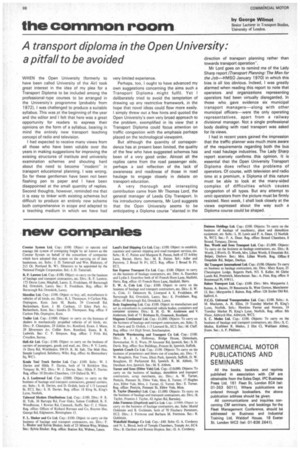A transport diploma in the Open University: a pitfall to be avoided
Page 100

If you've noticed an error in this article please click here to report it so we can fix it.
WHEN the Open University (formerly to have been called University of the Air) took great interest in the idea of my plea for a Transport Diploma to be included among the professional-type courses to be arranged in the University's programme (probably from 1972), I was challenged to produce a suitable syllabus. This was at the beginning of the year and the editor and I felt that here was a great opportunity for readers to express their opinions on the form of a syllabus, bearing in mind the entirely new transport teaching concept of radio and television.
I had expected to receive many views from all those who have been voluble over the years in making suggestions for improving the existing structures of institute and university examination schemes and shouting hard about the need to become "modern" in transport educational planning. I was wrong. So far these gentlemen have been not been flashing pen to paper and I have been disappointed at the small quantity of replies. Second thoughts, however, reminded me that it is easy to tinker with existing schemes but difficult to produce an entirely new scheme both comprehensive in scope and adapted to a teaching medium in which we have had very limited experience.
Perhaps, too, I ought to have advanced my own suggestions concerning the aims such a Transport Diploma might fulfil. Yet I deliberately tried to avoid the temptation of drawing up any restrictive framework, in the hope that novel ideas could flow more easily. I simply threw out a few hints and quoted the Open University's own very broad approach to the problem, exemplified in its view that a Transport Diploma could focus attention on traffic congestion with the emphasis perhaps placed on the technological viewpoint.
But although the quantity of correspondence has at present been limited, the quality of the few who have suggested schemes has been of a very good order. Almost all the replies came from the road passenger side, perhaps a sad reflection of the lack of awareness and readiness of those in road haulage to engage closely in debate on transport education.
A very thorough and interesting contribution came from Mr Thomas Lord, the general manager of Leeds City Transport. In his introductory comments, Mr Lord suggests that the Open University seems to be anticipating a Diploma course "slanted in the direction of transport planning rather than towards transport operation".
Mr Lord goes on to remind me of the Lady Sharp report (Transport Planning: The Men for the Job-H MS.0 January 1970) in which this bias is all too obvious. Indeed, I was greatly alarmed when reading this report to note that operators and organizations representing operators had been virtually disregarded. In those who gave evidence six municipal transport managers-along with other municipal officers-were the only operating representatives, apart from a railway divisional manager. Not a single professional body dealing with road transport was asked for its views.
I had in recent years gained the impression that the traffic planner was much more aware of the requirements regarding both the bus and road haulage industries. The Lady Sharp report scarcely confirms this opinion. It is essential that the Open University Transport Diploma does reflect the problems • of operators. Of course, with television and radio time at a premium, a Diploma of this nature must be able to look at the many-sided complex of difficulties which causes congestion of all types. But any attempt to omit operators from the picture must be firmly resisted. Next week, I shall look closely at the views expressed about the way such a Diploma course could be shaped.




























































































































































































